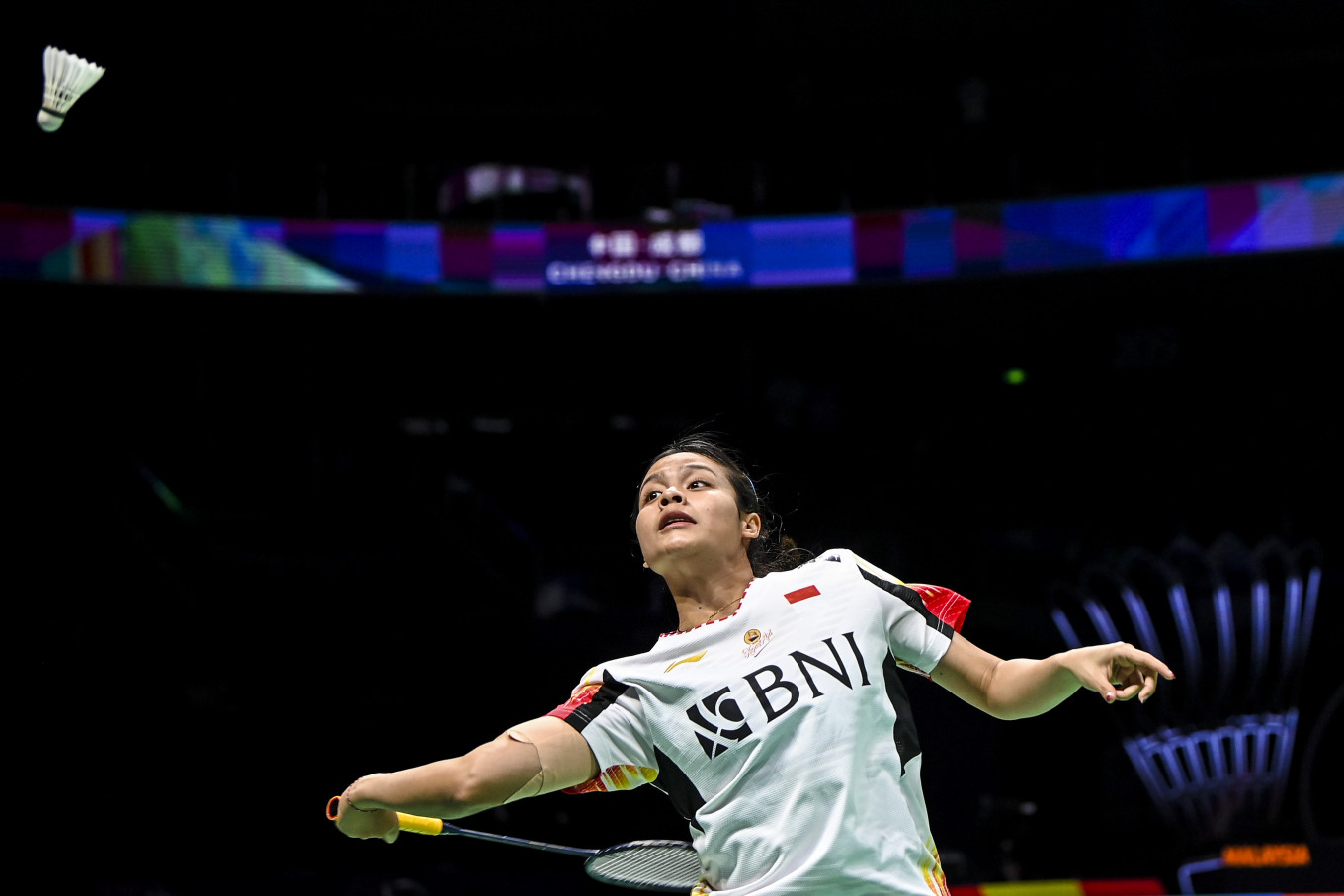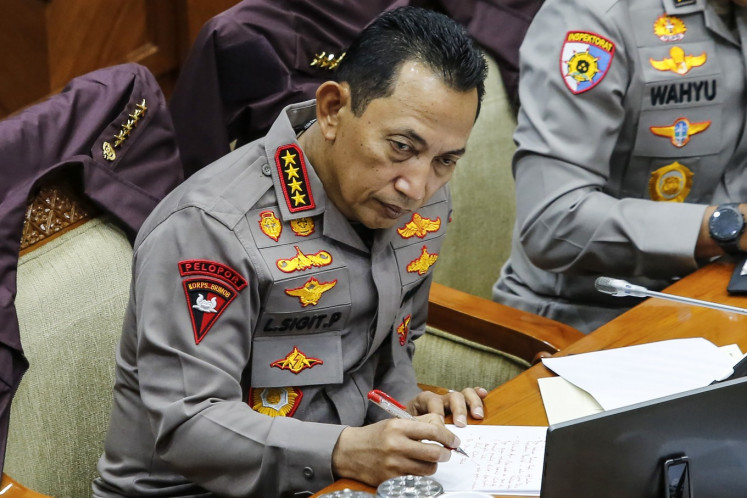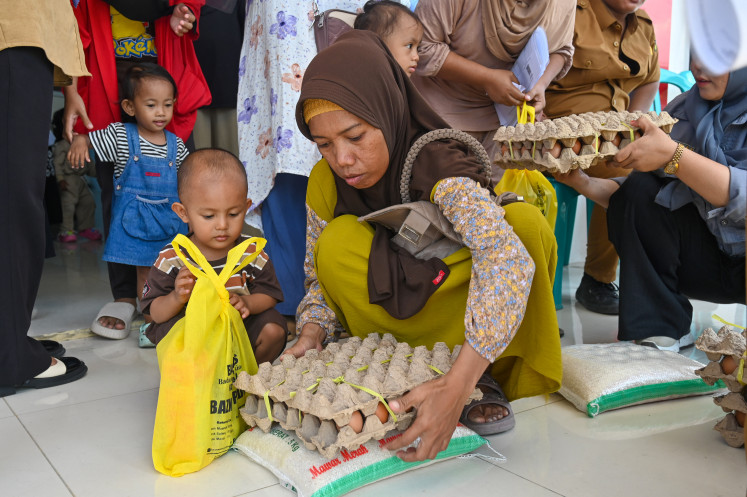Popular Reads
Top Results
Can't find what you're looking for?
View all search resultsPopular Reads
Top Results
Can't find what you're looking for?
View all search resultsSilver is just the beginning
The Uber Cup team was made up of players aged 21 years old on average, which observers deem as critical as they transition from the youth to senior level.
Change text size
Gift Premium Articles
to Anyone
 Indonesia’s badminton singles player Komang Ayu Cahya Dewi faces
off Japan’s Tomoka Miyazaki (not pictured) on May 1, 2024, during an Uber Cup
2024 elimination match at Chengdu Hi Tech Zone Sports Center Gymnasium in
Chengdu, China. Komang Ayu beat Miyazaki 21-12, 14-21, 21-13, placing
Indonesia as the runner-up in Group C. (Antara/Galih Pradipta)
Indonesia’s badminton singles player Komang Ayu Cahya Dewi faces
off Japan’s Tomoka Miyazaki (not pictured) on May 1, 2024, during an Uber Cup
2024 elimination match at Chengdu Hi Tech Zone Sports Center Gymnasium in
Chengdu, China. Komang Ayu beat Miyazaki 21-12, 14-21, 21-13, placing
Indonesia as the runner-up in Group C. (Antara/Galih Pradipta)
W
ith so many Indonesian eyes fixated on the soccer pitches in Qatar and France these past few weeks, they may have overlooked the badminton courts in Chengdu, China, last weekend, where Indonesian shuttlers gained a rare feat of cruising to the finals of both the Thomas Cup and Uber Cup.
The national men’s and women’s badminton teams eventually won silver medals after losing to host China, which also won a historic cup double.
A silver medal might be disappointing for the Indonesian Thomas Cup team, which reached its fourth final in the last five editions of the biennial tournament.
But for the national Uber Cup team, finishing second is considered a remarkable achievement. Indonesia had to wait for 16 years to make it to the Uber Cup final. The Indonesian Badminton Association (PBSI) did not even expect the women’s team to go as far as the final showdown.
Even more surprising is the team’s lineup, comprising youngsters with less experience in the team competition. The only players who had appeared in the Uber Cup three times or more were Gregoria Mariska Tunjung and Apriyani Rahayu.
The players, especially the Uber Cup team, deserve our commendation, but such compliments should not lead them to complacency. They need to work harder to finally lift the coveted trophies.
The Uber Cup team was made up of players aged 21 years old on average, which observers deem as critical as they transition from the youth to senior level. Complacency on the part of the players and the PBSI will only prevent them from developing their potential to the fullest.
The PBSI should learn from its failure to groom and support young players during such transitions in the past. An example is the case of singles player Elisabeth Purwaningtyas, who won the silver medal in the 2011 World Youth Championship at 18 and was therefore tipped as the country’s future badminton queen.
However, while the 2011 world youth champion, Ratchanok Intanon of Thailand, further developed and now is joining the ranks of world’s top female singles players, Elisabeth is not even in the top 140.
To produce a pool of future badminton stars who can emulate the country’s first Olympic gold medalist Susi Susanti and her teammates the PBSI should first and foremost draft a proper competition road map for the young shuttlers. By winning points in low-level tournaments across the globe throughout the year, players like 18-year-old Ester Narumi Tri Wardoyo can climb up the top 10 in the world rankings, for example.
Among Indonesian Uber Cup team members, only singles player Gregoria and doubles player Apriyani are in the top 10 in their respective categories. They currently rank ninth.
As the players participate in, and hopefully win, more competitions, the badminton association should provide a proper support system for the players. Apart from a coach who understands the potential and needs of each player, supporting staff like performance analysts, physiotherapists and sports psychologists are needed.
The psychologists were among the latest additions to the Indonesian badminton team, with ex-badminton player Lilik Sudarwati accompanying the team to Chengdu and other competitions. Fans and observers lauded this move, pointing to their crucial roles in giving the players a psychological boost before matches.
With the Paris 2024 Olympics on the horizon, the challenge is mounting for the PBSI to quickly move on from the Uber Cup and Thomas Cup defeats and prepare the players better for the world’s largest sporting event this summer.
With nine players, including four women, namely Gregoria in the women’s singles, Apriyani and Siti Fadia Silva Ramadhanti in the women’s doubles and Pitha Haningtyas Mentari in mixed doubles, qualifying for the Olympics, the PBSI should not waste the opportunity to help Indonesia win badminton medals.
The silver medals in Chengdu should mark the beginning of Indonesia’s resurgence in the badminton world. The PBSI must step up efforts to help the young female shuttlers keep their chins up and continue to fight for the rest of their bright, long careers.









